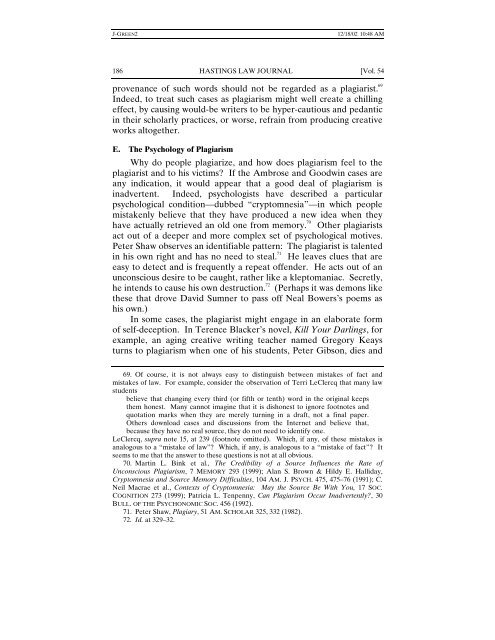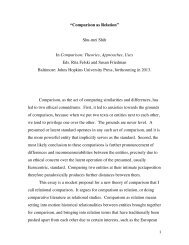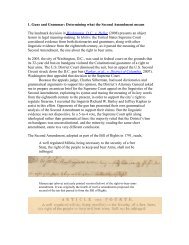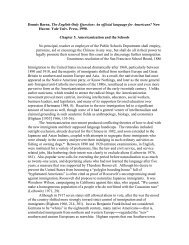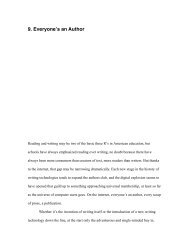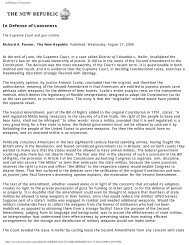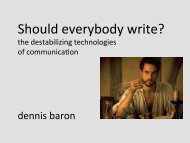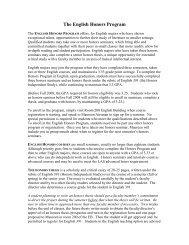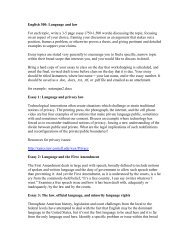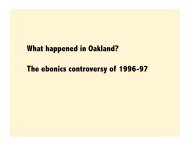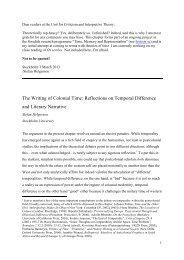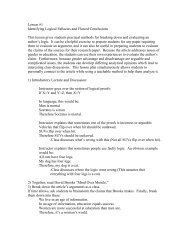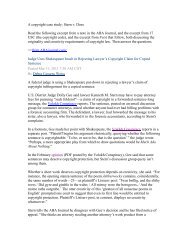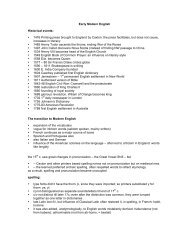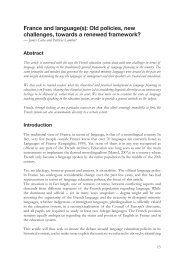Plagiarism, Norms, and the Limits of Theft Law: Some ... - English
Plagiarism, Norms, and the Limits of Theft Law: Some ... - English
Plagiarism, Norms, and the Limits of Theft Law: Some ... - English
You also want an ePaper? Increase the reach of your titles
YUMPU automatically turns print PDFs into web optimized ePapers that Google loves.
J-GREEN2 12/18/02 10:48 AM<br />
186 HASTINGS LAW JOURNAL [Vol. 54<br />
provenance <strong>of</strong> such words should not be regarded as a plagiarist. 69<br />
Indeed, to treat such cases as plagiarism might well create a chilling<br />
effect, by causing would-be writers to be hyper-cautious <strong>and</strong> pedantic<br />
in <strong>the</strong>ir scholarly practices, or worse, refrain from producing creative<br />
works altoge<strong>the</strong>r.<br />
E. The Psychology <strong>of</strong> <strong>Plagiarism</strong><br />
Why do people plagiarize, <strong>and</strong> how does plagiarism feel to <strong>the</strong><br />
plagiarist <strong>and</strong> to his victims? If <strong>the</strong> Ambrose <strong>and</strong> Goodwin cases are<br />
any indication, it would appear that a good deal <strong>of</strong> plagiarism is<br />
inadvertent. Indeed, psychologists have described a particular<br />
psychological condition—dubbed “cryptomnesia”—in which people<br />
mistakenly believe that <strong>the</strong>y have produced a new idea when <strong>the</strong>y<br />
have actually retrieved an old one from memory. 70 O<strong>the</strong>r plagiarists<br />
act out <strong>of</strong> a deeper <strong>and</strong> more complex set <strong>of</strong> psychological motives.<br />
Peter Shaw observes an identifiable pattern: The plagiarist is talented<br />
in his own right <strong>and</strong> has no need to steal. 71 He leaves clues that are<br />
easy to detect <strong>and</strong> is frequently a repeat <strong>of</strong>fender. He acts out <strong>of</strong> an<br />
unconscious desire to be caught, ra<strong>the</strong>r like a kleptomaniac. Secretly,<br />
he intends to cause his own destruction. 72 (Perhaps it was demons like<br />
<strong>the</strong>se that drove David Sumner to pass <strong>of</strong>f Neal Bowers’s poems as<br />
his own.)<br />
In some cases, <strong>the</strong> plagiarist might engage in an elaborate form<br />
<strong>of</strong> self-deception. In Terence Blacker’s novel, Kill Your Darlings, for<br />
example, an aging creative writing teacher named Gregory Keays<br />
turns to plagiarism when one <strong>of</strong> his students, Peter Gibson, dies <strong>and</strong><br />
69. Of course, it is not always easy to distinguish between mistakes <strong>of</strong> fact <strong>and</strong><br />
mistakes <strong>of</strong> law. For example, consider <strong>the</strong> observation <strong>of</strong> Terri LeClercq that many law<br />
students<br />
believe that changing every third (or fifth or tenth) word in <strong>the</strong> original keeps<br />
<strong>the</strong>m honest. Many cannot imagine that it is dishonest to ignore footnotes <strong>and</strong><br />
quotation marks when <strong>the</strong>y are merely turning in a draft, not a final paper.<br />
O<strong>the</strong>rs download cases <strong>and</strong> discussions from <strong>the</strong> Internet <strong>and</strong> believe that,<br />
because <strong>the</strong>y have no real source, <strong>the</strong>y do not need to identify one.<br />
LeClercq, supra note 15, at 239 (footnote omitted). Which, if any, <strong>of</strong> <strong>the</strong>se mistakes is<br />
analogous to a “mistake <strong>of</strong> law”? Which, if any, is analogous to a “mistake <strong>of</strong> fact”? It<br />
seems to me that <strong>the</strong> answer to <strong>the</strong>se questions is not at all obvious.<br />
70. Martin L. Bink et al., The Credibility <strong>of</strong> a Source Influences <strong>the</strong> Rate <strong>of</strong><br />
Unconscious <strong>Plagiarism</strong>, 7 MEMORY 293 (1999); Alan S. Brown & Hildy E. Halliday,<br />
Cryptomnesia <strong>and</strong> Source Memory Difficulties, 104 AM. J. PSYCH. 475, 475–76 (1991); C.<br />
Neil Macrae et al., Contexts <strong>of</strong> Cryptomnesia: May <strong>the</strong> Source Be With You, 17 SOC.<br />
COGNITION 273 (1999); Patricia L. Tenpenny, Can <strong>Plagiarism</strong> Occur Inadvertently?, 30<br />
BULL. OF THE PSYCHONOMIC SOC. 456 (1992).<br />
71. Peter Shaw, Plagiary, 51 AM. SCHOLAR 325, 332 (1982).<br />
72. Id. at 329–32.


